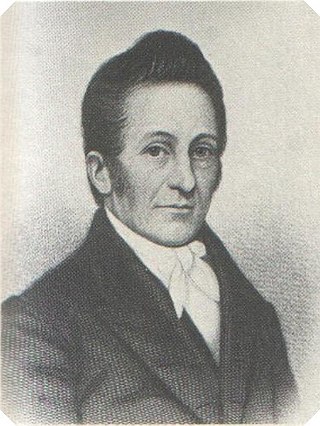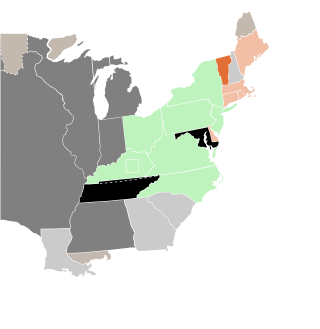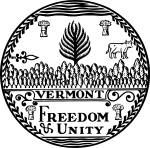These are tables of congressional delegations from Vermont to the United States Senate and United States House of Representatives.
The 1902 United States House of Representatives elections were held for the most part on November 4, 1902, with Oregon, Maine, and Vermont holding theirs early in either June or September. They occurred in the middle of President Theodore Roosevelt's first term, about a year after the assassination of William McKinley in September 1901. Elections were held for 386 seats of the United States House of Representatives, representing 45 states, to serve in the 58th United States Congress.

Richard Skinner was an American politician, attorney, and jurist who served as the ninth governor of Vermont.

The 1822–23 United States House of Representatives elections were held on various dates in various states between July 1, 1822, and August 14, 1823. Each state set its own date for its elections to the House of Representatives before the first session of the 18th United States Congress convened on December 1, 1823. They occurred during President James Monroe's second term.
The 1814–15 United States House of Representatives elections were held on various dates in various states between April 26, 1814, and August 10, 1815. Each state set its own date for its elections to the House of Representatives before the first session of the 14th United States Congress convened on December 4, 1815. They occurred during President James Madison's second term. Elections were held for all 182 seats, representing 18 states.

The 1812–13 United States House of Representatives elections were held on various dates in various states between August 3, 1812, and April 30, 1813. Each state set its own date for its elections to the House of Representatives before the first session of the 13th United States Congress convened on May 24, 1813. They coincided with James Madison being re-elected president.

William Slade Jr. was an American Whig and Anti-Masonic politician. He served as a U.S. Representative from Vermont from 1831 to 1843, where he was an outspoken opponent of slavery. He was the 17th governor of Vermont.
Phineas White was an American lawyer and politician. He served one term as United States Representative from Vermont from 1821 to 1823.

Bradley Barlow was a nineteenth-century banker and politician who served as a U.S. Representative from Vermont for one term from 1879 to 1881.
William Chamberlain was an American politician from Vermont. He served as a United States representative and as the fourth lieutenant governor of Vermont.

Elections in Vermont are authorized under Chapter II of the Vermont State Constitution, articles 43–49, which establishes elections for the state level officers, cabinet, and legislature. Articles 50–53 establish the election of county-level officers.

The 1814–15 United States Senate elections were held on various dates in various states. As these U.S. Senate elections were prior to the ratification of the Seventeenth Amendment in 1913, senators were chosen by state legislatures. Senators were elected over a wide range of time throughout 1814 and 1815, and a seat may have been filled months late or remained vacant due to legislative deadlock. In these elections, terms were up for the senators in Class 1.

Vermont gained two seats after the 1810 census. Rather than re-district, however, Vermont replaced its districts with a single at-large district. It would continue to use an at-large district in 1814, 1816, and 1818, then one more time in 1822.

Following the September 1808 election for delegates to represent Vermont in the 11th United States Congress, two of its four districts had failed to choose representatives. A second ballot was held in December, giving Vermont a total of three Federalist representatives and one Democratic-Republican.

The 1988 United States Senate election in Vermont took place on November 8, 1988. Incumbent Republican Robert Stafford did not run for re-election to another term in the United States Senate. Republican candidate Jim Jeffords defeated Democratic candidate Bill Gray to succeed him.

The 2016 United States House of Representatives election in Vermont was held on November 8, 2016, to elect the U.S. representative from the state of Vermont from Vermont's at-large congressional district. The election coincided with the 2016 U.S. presidential election, as well as other elections to the House of Representatives, elections to the United States Senate and various state and local elections. The primaries were held on August 9.

The 1988 United States House of Representatives election in Vermont was held on November 8, 1988. Republican nominee Peter Plympton Smith defeated Independent candidate Bernie Sanders and Democratic nominee Paul N. Poirier.

The 1814 Vermont gubernatorial election for Governor of Vermont took place in September and October, and resulted in the election of Martin Chittenden to a one-year term.
This page is based on this
Wikipedia article Text is available under the
CC BY-SA 4.0 license; additional terms may apply.
Images, videos and audio are available under their respective licenses.











